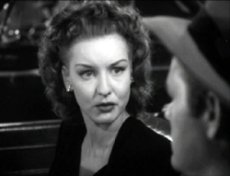Is It Really a Great Movie? Part Fifteen: Detour
by dan heaton
Using Roger Ebert's Great Movies book as a guide, this series of articles will focus on all films included on his list that previously have escaped my notice. Since all lists are subjective, I am not treating Ebert's choices as the essential selection of films. However, his essays offer the perfect chance for me to explore both classics and lesser-known pictures from around the globe.

Although it is widely considered a seminal film noir picture, I had never heard of Detour prior to this viewing. Directed by Edgar Ulmer and released in 1945, this low-budget tale of poor fate and nasty behavior had slipped through the cracks. However, Time Magazine placed it on its list of the 100 ALL-TIME Movies alongside classics like Double Indemnity and Out of the Past. The Austrian-American Ulmer thrived with small budgets while working at a variety of Poverty Row studios. Itís also interesting to note the off-screen troubles of star Tom Neal, who fought a romantic rival in 1951 and delivered a smashed cheekbone, broken nose, and brain concussion on the guy. In 1965, the former boxer stood trial for the gunshot murder of his wife and was convicted of the lesser charge of involuntary manslaughter.
Filmed in six days for the meager sum of $5,000, this bleak film depicts a cowardly man who believes heís been cursed by fate. However, his consistently bad decisions play a considerable role in his unfortunate situation. Al Roberts (Tom Neal) lives in New York and plays piano at a mid-level drinking establishment. He loves Sue (Claudia Drake) Ė a singer of modest talent Ė but she appears more concerned with making it in Hollywood. After she leaves him, Al decides to hitchhike all the way to California and see her. This choice is not a smart one. After catching a ride with the shifty Charles Haskell Jr. (Edmund MacDonald), Al is shocked to realize the guy has died in his sleep. Believing the cops wouldnít accept his story, he decides to hide the body and take his possessions. The bounty includes the car, which Al uses to continue traveling to Hollywood. Although he claims to have no choice, his motives feel a bit hollow and arenít that simple. It will only get worse.
If his problems werenít serious enough, Alís life becomes even worse with the appearance of the slightly crazed Vera (Ann Savage). After realizing that heís not Haskell, she takes over the operation and enacts some minor criminal schemes. Al protests each idea, but his denials are not supported by any serious conviction. Instead, he goes along with her plans, which could lead to disaster. Ann Savage chews up every scene and leaves her co-star quivering in fear. Her performance is way over the top and unbelievable, but she does bring much-needed energy to a fairly slow picture. Neal does fine as the wimpy protagonist, but Alís grumpiness is not very endearing. By bringing in the even less affable Vera, Ullmer and Writer Martin Goldsmith make Alís situation understandable but canít get us to identify with his poor moves.
Narrated by Al in flashback, the 68-minute story includes basic sets and cannot hide its extremely low budget. The rear-projection car scenes are often laughable, and early scenes in New York appear in major fog to hide the spare background. This simple structure limits the filmís scope, but it also adds to the dreary noir environment. Alís narration occurs in a simple, dark shot that actually enhances his inner turmoil. The lengthy scenes in the car and hotel lack impressive visuals, but they do keep the focus on Alís unfortunate mishaps. The result is far from groundbreaking, but it works surprisingly well considering the financial restrictions.
Roger Ebert describes Detour as ďso filled with imperfections that it would not earn the director a passing grade in film school.Ē However, he also describes its enduring qualities and ďembodiment as the guilty soul of film noir.Ē I agree with both assessments, but my weight falls stronger on the first point. Iím glad to have seen this entertaining film, but I would not describe it as a Great Movie. It works effectively as a genre picture, and Ulmerís ability to deliver this much on such a low budget is impressive. However, the story is too thin to deserve such high praise and Nealís acting is very stilted. As a film-noir enthusiast, I do recommend this film, but my admiration falls a bit short of calling it a classic film.
Copyright (c) 2007 erasing clouds |
|